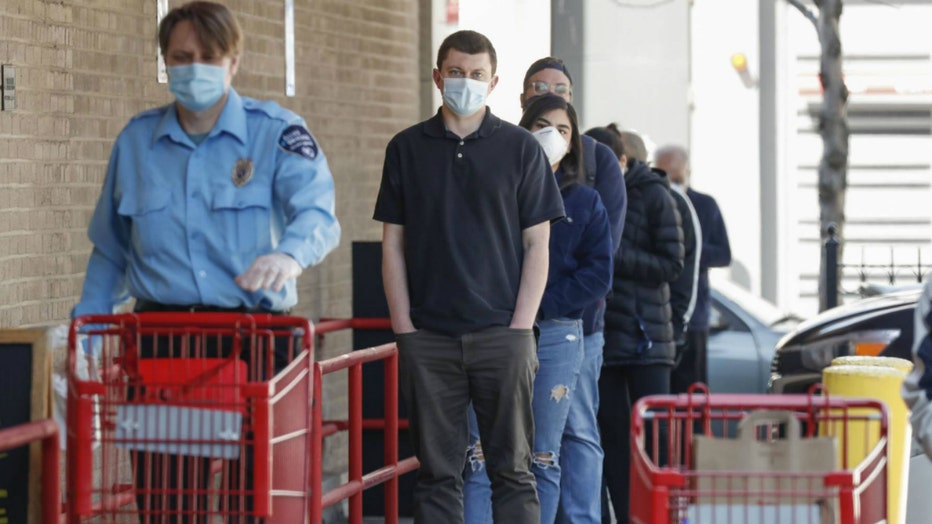Illinois enters new reopening phase as Pritzker urges caution

Illinois enters new reopening phase; Pritzker urges caution
Gov. J.B. Pritzker warned Illinois residents on Friday to remain vigilant even as the state began to loosen restrictions intended to curb the deadly coronavirus, and he expressed gratitude for the actions taken over the last 10 weeks.
CHICAGO - Gov. J.B. Pritzker warned Illinois residents on Friday to remain vigilant even as the state began to loosen restrictions intended to curb the deadly coronavirus, and he expressed gratitude for the actions taken over the last 10 weeks.
With a slowly declining number of new cases of COVID-19, the illness caused by coronavirus infection, Pritzker ended an executive order limiting movement outside the home to necessary tasks and emergencies and allowed the state to move into a new phase of recovery.
The third stage of the Democrat’s five-part Restore Illinois program means a return of manufacturing and retail sales, outdoor restaurant dining and social gatherings of no more than 10 people who keep at least 6 feet apart from one another and wear face masks.
Pritzker praised the perseverance of the state’s residents and said he wasn’t surprised by their generosity and neighborly concern. But he added, “We have to be careful. Things, as they open up ..., the opportunities to catch COVID-19 open up.”
Dr. Ngoze Ezike, the state public health director, reported 1,622 new COVID-19 cases Friday and 86 additional deaths. Complications related to the virus have now taken 5,270 lives in the state among 117,455 confirmed cases of the illness.
Dr. Ezike also warned that with the state reopening, asymptomatic carriers can still unknowingly spread COVID-19.
"It's very important to wear our masks all the time...the virus is still circulating," she said.

Photo by Joel Lerner/Xinhua via Getty) (Xinhua/ via Getty Images
Within the past 24 hours in Illinois, laboratories have processed 25,513 virus tests. In total, the state has administered 855,479 tests.
"Please be safe as we head into this weekend, into Phase 3," Dr. Ezike concluded.
The virus has been reported in 101 of the state's 102 counties. The age of cases ranges from younger than one to older than 100 years.
Numbers reported daily by the Department of Public Health show a distinct break in the crisis three weeks ago. Totals peaked the week of May 3 with 793 deaths and 17,580 new COVID-19 cases. Both numbers have slowly dropped each week since. The state is on pace this week to record approximately 11,300 cases and 570 additional deaths.
Pritzker closed schools and non-essential businesses during the third week of March, the first showing substantial growth in Illinois’ COVID-19 cases. On March 21, he imposed a stay-at-home order, which he extended twice, through Friday.
The less-stringent rules come about as each of the four regions of the state outlined in Restore Illinois meet necessary qualifications. They are: No more than 20% of tests for the coronavirus indicating infections and no substantial change in that “positivity rate” for 14 days; stable or decreasing numbers of COVID-19 hospitalizations over a 28-day period, and sufficient bed-space and equipment available should there be a surge in infections.
Pritzker has maintained that his response to the pandemic is guided by “science” and the medical experts such as Ezike and epidemiologists advising him. He said Friday that neither his office nor his campaign operation has conducted any polls to gauge voters’ reaction.
“I’ve read (other) polling results and I can say honestly that it’s clear that people supported this stay-at-home order, that people are deeply concerned to make sure that their fellow Illinoisans are kept safe and healthy,” Pritzker said.
But there was backlash against the restrictions that were extended through May. Pritzker was named in a lawsuit by a state legislator challenging his executive powers, representing the impatience of some residents of central and southern Illinois who saw the restrictions as too harsh for areas not hit at hard by the pandemic as Chicago.
There have been multiple legal challenges from houses of worship, and Pritzker finally dropped objection to religious gatherings, although the state still recommends no more than 10 people gather at once or that religious facilities limit attendance to 25% of capacity.
Outdoor dining at restaurants, with proper social distancing and face coverings worn by wait staff, is another concession that initially wasn’t part of the third phase of recovery.
Associated Press contributed to this report.

